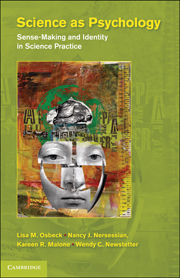Book contents
- Frontmatter
- Contents
- Acknowledgments
- 1 Introduction: Science and Persons
- 2 Methods of Study
- 3 The Problem-Solving Person
- 4 The Feeling Person
- 5 The Positioning Person
- 6 The Person Negotiating Cultural Identities
- 7 The Learning Person
- 8 Epilogue: Science as Psychology: A Tacit Tradition and Its Implications
- References
- Index
4 - The Feeling Person
Published online by Cambridge University Press: 05 July 2011
- Frontmatter
- Contents
- Acknowledgments
- 1 Introduction: Science and Persons
- 2 Methods of Study
- 3 The Problem-Solving Person
- 4 The Feeling Person
- 5 The Positioning Person
- 6 The Person Negotiating Cultural Identities
- 7 The Learning Person
- 8 Epilogue: Science as Psychology: A Tacit Tradition and Its Implications
- References
- Index
Summary
In this chapter we consider the role of emotion in research practices by examining a class of expressions we have coded and analyzed as implicating emotion, affect, or motivation in the interview data. As noted, this book with its current focus was not planned at the time we began to analyze interview data, and we did not approach coding with the explicit goal of identifying expressions of this kind within the interviews conducted. However, while we were seeking to describe and code cognitive practices as evidenced in the interviews, we found striking examples of interview text that did not fit traditional cognitive categories, but seemed rather to have an affective or emotional tone. Other passages seemed expressive of desires, goals, and aspirations. Although not clearly cognitive, passages of these kinds seemed intimately related to and interwoven with accounts of problem formulation and solving, leading us eventually to code “affect/motivation” as a higher-order category and for this book to include it in the domain of general sense-making that is characteristic of laboratory activity. As Thagard remarked recently, “Affect is a natural subject for a dynamical theory that emphasizes the flow of thought and the complex interactions of emotion and cognition” (2008, p. 51). We also found that affective, emotional, and motivational expressions related intimately to identity formations, as is discussed in some detail in the next chapter.
Importantly, we assigned codes for affective and motivational expressions in both laboratories (A and D) and across levels of expertise, from PI to novice.
- Type
- Chapter
- Information
- Science as PsychologySense-Making and Identity in Science Practice, pp. 92 - 119Publisher: Cambridge University PressPrint publication year: 2010

